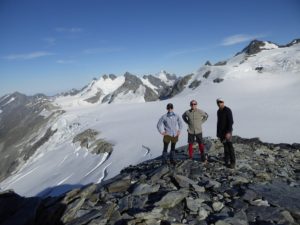University of Otago researchers have just returned from one of New Zealand’s largest ice fields – the Gardens of Eden and Allah – which they say are melting quicker than usual due to the hot summer.
 The ice field straddles the Southern Alps and feeds into major rivers include the Rakaia and Rangitata in Canterbury and the Whanganui on the West Coast. But Associate Professor Nicolas Cullen and Dr Pascal Sirguey say the summer’s high temperatures have led to a “massive melt-off of snow”.
The ice field straddles the Southern Alps and feeds into major rivers include the Rakaia and Rangitata in Canterbury and the Whanganui on the West Coast. But Associate Professor Nicolas Cullen and Dr Pascal Sirguey say the summer’s high temperatures have led to a “massive melt-off of snow”.
“Glaciers are in retreat and that is definitely linked to climate change,” Dr Cullen said. “Air temperature is a governing factor in the health of ice fields and glaciers as it controls melt and whether it rains or snows. As such, the changes in both the timing and volume of runoff from glaciers and seasonal snow will affect New Zealand’s hydropower generation, irrigation, and agriculture in the future.”
He said that while rainfall was the main input into river catchments, glacier meltwaters also played a part. “Water availability is set to become a major issue.:
The findings were covered by local media, including:
NZ Herald: South Island snow ‘melt-off’ in heat could affect power and irrigation
TVNZ: Scorching temperatures over 30C expected in South Island today, magnifying fire risk in Otago
Stuff.co.nz: Hot weather having massive impact on New Zealand’s ‘water tower’ glaciers
Radio NZ: “Massive snow melt” concerning: researchers